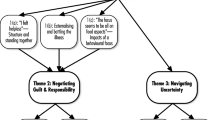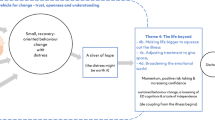Abstract
Family based treatment of anorexia nervosa (AN) requires heavy parental involvement. To be effective, parents must possess a coherent understanding of the illness and believe that it is treatable. Yet we know little of how parents view the illness, nor whether these views are unique to AN. We examined illness perceptions in AN, how they compare to those of individuals with a serious medical illness, and how they relate to adjustment and coping. Twenty-five girls with AN, 24 girls with Type I diabetes, and their mothers completed measures of family functioning and psychological symptoms. Mothers also completed a measure of illness perceptions. Mothers viewed AN as less chronic, understandable, and controllable than mothers of girls with diabetes viewed their daughter’s respective illness. Such negative cognitions were associated with poor family functioning and maternal and adolescent adjustment. These findings have implications for enhancing family based treatments, as well as for modifying public health messages to reduce the pervasive stigma that influences such unhelpful perceptions about the illness.
Similar content being viewed by others
References
Abidin, R., & Brunner, J. (1995). Development of a Parenting Alliance Inventory. Journal of Clinical Child Psychology, 24, 31–40.
Anderson, A. (1983). Anorexia Nervosa and Bulimia. Medical Aspects of Human Sexuality, 17, 57–62.
Beck, A. T., & Beck, R. W. (1972). Screening depressed patients in family practice. A rapid technic. Postgraduate Medicine, 52, 81–85.
Beck, A. T., Steer, R. A., & Brown, T. A. (1996). Manual for the beck depression inventory-II. San Antonio: Psychological Corporation.
Bloomquist, M. L., & Harris, W. G. (1984). Measuring family functioning with the MMPI: A reliability and concurrent validity study of three MMPI family scales. Journal of Clinical Psychology, 40, 1209–1214.
Button, E. J., & Warren, R. L. (2001). Living with anorexia nervosa:The experience of a cohort of sufferers from anorexia nervosa 7.5 years after initial presentation to a specialized eating disorders service. European Eating Disorders Review, 9, 74–96. doi:10.1002/erv.400.
Carter, J. C., Stewart, D. A., & Fairburn, C. G. (2001). Eating disorder examination questionnaire: Norms for young adolescent girls. Behaviour Research and Therapy, 39, 625–632.
Crow, S. J., Peterson, C. B., Swanson, S. A., Raymond, N. C., Specker, S., Eckert, E. D., et al. (2009). Increased mortality in bulimia nervosa and other eating disorders. American Journal of Psychiatry, 166, 1342–1346. doi:10.1176/appi.ajp.2009.09020247.
de la Rie, S. M., van Furth, E. F., De Koning, A., Noordenbos, G., & Donker, M. C. (2005). The quality of life of family caregivers of eating disorder patients. Eating Disorders, 13, 345–351.
DiClemente, C. C., & Hughes, S. O. (1990). Stages of change profiles in alcoholism treatment. Journal of Substance Abuse, 2, 217–235.
Eisler, I., Dare, C., Hodes, M., Russell, G., Dodge, E., & Le Grange, D. (2000). Family therapy for adolescent anorexia nervosa: the results of a controlled comparison of two family interventions. Journal of Child Psychology and Psychiatry and Allied Disciplines, 41, 727–736.
Fairburn, C. G., & Beglin, S. J. (1994). Assessment of eating disorders: interview or self-report questionnaire? International Journal of Eating Disorders, 16, 363–370.
Field, C. A., Adinoff, B., Harris, T. R., Ball, S. A., & Carroll, K. M. (2009). Construct, concurrent and predictive validity of the URICA: Data from two multi-site clinical trials. Drug and Alcohol Dependence, 101, 115–123.
Fortune, G., Barrowclough, C., & Lobben, F. (2004). Illness representation in depression. British Journal of Clinical Psychology, 43, 347–364.
Furlanetto, L. M., Mendlowicz, M. V., & Romildo Bueno, J. (2005). The validity of the beck depression inventory-short form as a screening and diagnostic instrument for moderate and severe depression in medical inpatients. Journal of Affective Disorders, 86, 87–91.
Gibaud-Wallston, J., & Wandesman, L. (1978). Development and utility of the Parenting Sense of Competence Scale. Paper presented at the 86th annual convention of the American Psychological Association, Toronto, Ontario, Canada.
Heijmans, M. (1999). The role of patients’ illness representations in coping and functioning with Addisons disease. British Journal Health Psychology, 4, 137–149.
Heijmans, M., de Ridder, D., & Bensing, J. (1999). Dissimilarity in patients’ and spouses representations of chronic illness: Exploration of relations to patient adaptation. Psychological Health, 14, 451–466.
Higbed, L., & Fox, J. R. E. (2010). Illness perceptions in anorexia nervosa: A qualitative investigation. British Journal of Clinical Psychology, 49, 307–325.
Holliday, J., Wall, E., Treasure, J., & Weinman, J. (2005). Perceptions of illness in individuals with anorexia nervosa: a comparison with lay men and women. International Journal of Eating Disorders, 37, 50–56.
Johnston, C., & Mash, E. J. (1989). A measure of parenting satisfaction and efficacy. Journal of Clinical Child Psychology, 18, 167–175.
Kashani, J. H., Sherman, D. D., Parker, D. R., & Reid, J. C. (1990). Utility of the beck depression inventory with clinic-referred adolescents. Journal of the American Academy of Child and Adolescent Psychiatry, 29, 278–282.
Kemp, S., Morley, S., & Anderson, E. (1999). Coping with epilepsy: Do illness representations play a role? British Journal of Clinical Psychology, 38, 43–58.
Kuipers, E., Watson, P., Onwumere, J., Bebbington, P., Dunn, G., Weinman, J., et al. (2007). Discrepant illness perceptions, affect and expressed emotion in people with psychosis and their carers. Social Psychiatry and Psychiatric Epidemiology, 42, 277–283.
Le Grange, D., Eisler, I., Dare, C., & Russell, G. (1992). Evaluation of family treatments in adolescent anorexia nervosa: A pilot study. International Journal of Eating Disorders, 12, 347–357.
Leahy, J. M. (1992). Validity and reliability of the beck depression inventory-short form in a group of adult bereaved females. Journal of Clinical Psychology, 48, 64–68.
Leventhal, H., Brissette, I., & Leventhal, E. A. (1984a). The common-sense model of self-regulation of health and illness. In L. D. Cameron (Ed.), The self-regulation of health and illness behaviour (pp. 42–65). New York City: Routledge.
Leventhal, H., Nerenz, D. R., & Steele, D. F. (1984b). Illness representations and coping with health threats. In A. Baum & J. Singer (Eds.), Handbook of psychology and health (Vol. 4). Hillsdale, NJ: Erlbaum.
Lock, J., Le Grange, D., Agras, W. S., Moye, A., Bryson, S. W., & Jo, B. (2010). Randomized clinical trial comparing family-based treatment with adolescent-focused individual therapy for adolescents with anorexia nervosa. Archives of General Psychiatry, 67(10), 1025–1032.
Luce, K. H., & Crowther, J. H. (1999). The reliability of the eating disorder examination-Self-report questionnaire version (EDE-Q). International Journal of Eating Disorders, 25, 349–351.
March, J. S., Parker, J. D., Sullivan, K., Stallings, P., & Conners, C. K. (1997). The multidimensional anxiety scale for children (MASC): Factor structure, reliability, and validity. Journal of the American Academy of Child and Adolescent Psychiatry, 36, 554–565.
McClenahan, R., & Weinman, J. (1998). Determinants of carer distress in non-acute stroke. International Journal of Language and Communication Disorders, 33(Suppl), 138–143.
Mechanic, D., McAlpine, D. D., Rosenfield, S., & Davis, D. (1994). Effects of illness attribution and depression on the quality of life among persons living with serious mental illness. Social Science and Medicine, 39, 155–164.
Meyer, T. J., Miller, M. L., Metzger, R. L., & Borkovec, T. D. (1990). Development and validation of the Penn State Worry Questionnaire. Behaviour Research and Therapy, 28, 487–495.
Moos, R., & Moos, B. (1986). Family environment scale manual. Palo Alto: Consulting Psychology Press.
Moss-Morris, R., Petrie, K., & Weinman, J. (1996). Functioning in chronic fatigue syndrome: Do illness perceptions play a regulatory role? British Journal of Clinical Psychology, 1, 15–25.
Moss-Morris, R., Weinman, J., Petrie, K., Horne, R., Cameron, L., & Buick, D. (2002). The revised illness perception questionnaire. Psychological Health, 17, 1–16.
Pantalon, M. V., Nich, C., Franckforter, T., & Carroll, K. M. (2002). The URICA as a measure of motivation to change among treatment-seeking individuals with concurrent alcohol and cocaine problems. Psychology of Addictive Behaviors, 16, 299–307.
Richter, P., Werner, J., Heerlein, A., Kraus, A., & Sauer, H. (1998). On the validity of the beck depression inventory. A review. Psychopathology, 31, 160–168.
Scharloo, M., Kaptein, A., Weinman, J., Hazes, J. M., Willems, L. N. A., Bergman, W., et al. (1998). Illness perceptions, coping and functioning in patients with rheumatoid arthritis, chronic obstructive pulmonary disease and psoriasis. Journal of Psychosomatic Research, 44, 573–585.
Sim, L. A., Homme, J. H., Lteif, A. N., Vande Voort, J. L., Schak, K. M., & Ellingson, J. (2009). Family functioning and maternal distress in adolescent girls with anorexia nervosa. International Journal of Eating Disorders, 42, 531–539. doi:10.1002/eat.20654.
Stewart, M.-C., Keel, P. K., & Schiavo, R. S. (2006). Stigmatization of anorexia nervosa. International Journal of Eating Disorders, 39, 320–325.
Strain, J. J. (1979). Psychological reactions to chronic medical illness. Psychiatric Quarterly, 51, 173–183.
Swanson, S. A., Crow, S. J., Le Grange, D., Swendsen, J., & Merikangas, K. R. (2011). Prevalence and correlates of eating disorders in adolescents: Results from the national comorbidity survey replication adolescent supplement. Archives of General Psychiatry, supplement, 2011–2022. doi:10.1001/archgenpsychiatry.2011.22.
Weinman, J., Petrie, K., Sharpe, N., & Walker, S. (2000). Causal attributions in patients and spouses following first time myocardial infarction and subsequent lifestyle changes. British Journal Health Psychology, 5, 263–273.
Whitney, J., Murray, J., Gavan, K., Todd, G., Whitaker, W., & Treasure, J. (2005). Experience of caring for someone with anorexia nervosa: A qualitative study. British Journal of Psychiatry, 187, 444–449. doi:10.1192/bjp.187.5.444.
Whitney, J., Haigh, R., Weinman, J., & Treasure, J. (2007). Caring for people with eating disorders: Factors associated with psychological distress and negative caregiving appraisals in carers of people with eating disorders. British Journal of Clinical Psychology, 46, 413–428.
Zabala, M., MacDonald, P., & Treasure, J. (2009). Appraisal of caregiving burden, expressed emotion and psychological distress in families of people with eating disorders: A systematic review. European Eating Disorders Review, 17, 338–349.
Author information
Authors and Affiliations
Corresponding author
Rights and permissions
About this article
Cite this article
Sim, L., Matthews, A. The Role of Maternal Illness Perceptions in Family Functioning in Adolescent Girls with Anorexia Nervosa. J Child Fam Stud 22, 541–550 (2013). https://doi.org/10.1007/s10826-012-9607-z
Published:
Issue Date:
DOI: https://doi.org/10.1007/s10826-012-9607-z




